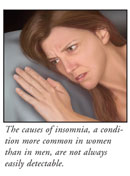 Brief or Prolonged Sleep Disruption
Brief or Prolonged Sleep Disruption
Although most people think of insomnia as trouble falling asleep, there are several types of insomnia. Strictly speaking, insomnia includes not only trouble falling asleep, but also difficulty staying asleep, waking up too early, or not getting restful sleep. Insomnia can last for a brief period, such as a few days during a stressful event or due to jet lag, or it can become chronic, lasting for months.
The causes of insomnia are not always easy to discover. A disease or symptom of a disease, such as the chronic pain of arthritis, can lead to insomnia. Certain prescription or OTC medications can cause sleep problems. Anxiety, depression, or both can also lead to chronic insomnia.
The symptoms of insomnia are the same as the symptoms you would experience anytime you went to bed too late or woke up too early; that is, anytime you did not get enough restful sleep. These symptoms include a lack of energy, problems with memory or concentration, sleepiness, and even physical symptoms such as headache, rapid heartbeat, or nausea.
The initial treatment for insomnia is to look for a cause of the problem and treat this first, if possible. Your doctor or pharmacist can help determine if your medication is causing sleep problems.If pain, anxiety, or depression is the cause of poor sleep, these conditions can be treated as well.
Practicing good “sleep hygiene” habits before bedtime can greatly improve insomnia. Sleep hygiene refers to a group of simple steps you can take to treat sleep problems. Some of these steps include the use of relaxation techniques; avoidance of exercise, caffeine, nicotine, and alcohol before bedtime; and retiring and awakening each day around the same time. When these lifestyle changes are not effective, sleep medications can be used for a period of several weeks until the cause of insomnia is treated. If your doctor is concerned about another sleep disorder such as sleep apnea or restless leg syndrome, an overnight stay in a sleep study laboratory may help make the diagnosis.
One Person’s Normal Sleep Habits Might Be Abnormal for the Next
About one-third of adults have a problem with occasional insomnia, and less than 10% suffer from chronic insomnia. Disrupted sleep patterns are seen more often in women and older adults. But what is a normal sleep pattern?
What may be considered normal for some people may not be for others, and as we get older, sleep patterns may change. Most adults need between seven and eight hours of sleep each night, but these needs can range from five to 10 hours. If people do not get the sleep they need each night, they will not adapt to less sleep. Eventually, the body will revolt against this lack of sleep with symptoms such as nausea, headache, or rapid heartbeat. Problems with sleepiness, concentration, memory, and slowed reflexes also result from a lack of sleep.
Once lack of sleep begins to interfere with the ability to function for several weeks, a visit to the doctor will help determine a diagnosis. It is important to have an accurate record of your sleep pattern when visiting a physician. The record should include what time you go to sleep, what time you wake up, how long the insomnia has been going on, any stressful events in your life currently, and when you have trouble sleeping—the evening, during the night, or the early morning. This sleep pattern will help the doctor decide which insomnia medication would be best for you.
Treatment for insomnia begins by identifying possible causes that might interfere with a restful night’s sleep and treating those causes first. In the case of another disease or symptom such as chronic pain or restless leg syndrome, sleep will return to a more normal pattern once the condition is treated. A review of daily medications may identify a drug-induced insomnia. Anxiety or depression can be treated with behavioral therapy and medications.
Sleep hygiene is the term used for simple lifestyle changes that can be used to improve sleep. Most important of these steps is to schedule a set time to sleep each day (i.e., going to bed and waking up at approximately the same time). If there is a way to sleep until the sun rises, that is a good way to keep your body’s rhythm on track. If it takes longer than 30 to 60 minutes to fall asleep, many doctors will recommend doing another relaxing activity (other than lying in bed) until you feel drowsy. The bedroom should be a pleasant temperature, and the bed should be comfortable as well. It is best to avoid exercise, alcohol, caffeine, and nicotine just before bedtime.
Treatment with sleep medications, sometimes called hypnotics, is very effective for a short period; however, over time many hypnotics stop working and can even have a negative effect on sleep. Some people find OTC sleep aids such as the antihistamine diphenhydramine helpful for an occasional night of insomnia. These drugs are not hypnotics, but because they cause drowsiness as a side effect, they are helpful to people with mild insomnia who have trouble falling asleep. With continued use, antihistamines will lose their ability to cause drowsiness. Natural products or dietary supplements such as melatonin or valerian are available without a prescription and claim to be sleep aids, but more research is needed before these can be recommended as safe and effective in treating insomnia.
Prescription hypnotics are relatively safe if used according to directions for a short period of time. These medications can cause side effects that can be dangerous, such as dizziness, falls, and falling asleep while driving or eating. Some hypnotics work best to begin sleep, while others help people continue to sleep throughout the night. Examples of prescription hypnotics include eszopiclone (Lunesta), ramelteon (Rozerem), temazepam (Restoril), triazolam (Halcion), zaleplon (Sonata), and zolpidem (Ambien). Your doctor can decide which medication is best for your pattern of insomnia, taking into account your age, medical history, current diseases, kidney and liver function, and other medications you are taking. If depression, anxiety, or both are the cause of insomnia, an antidepressant that causes drowsiness is often the best treatment choice.






